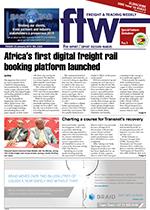Supply chain property development “seems to be a logical place” for fixed asset venture investors eager to explore new opportunities because of over-investment in office space and shopping malls, logistics expert Martin Bailey told FTW. But short-term uncertainties such as South Africa’s mercurial politics, further fired by a national election expected in May, all entered into the mix of probabilities, the chairman of Industrial Logistic Systems stressed. Bailey’s comments come in the wake of recent news that an uptick has been detected among fund managers, landlords and their offshore peers who all appear to be readying themselves for the expected growth in local online retail sales. Comparatively speaking that figure is still relatively low as only 2% of South African shopping is transacted via popular portals such as Takealot. In the UK, for example, e-commerce’s retail footprint has grown to 30% and the upward curve arrow is pointing steeply skywards. Elaborating on global online sales trends, Bailey said the predominant strength was particularly in “A-income markets and is clearly restricted in Africa”. Yet he also expects to see an increase in new technology business. “We also have continuous pressure to centralise and improve operational productivity in all market sectors, and that means we need new, modern, betterdesigned facilities. “Added to this is the culture of ‘I want it now’ along with an explosion of product ranges – and that adds pressure to have suitable facilities to execute the supply chain needs.” Recently, technology pundit and owner of World Wide Worx, Arthur Goldstuck, also indicated that the hoped-for drop in data costs and the inversely proportional increased interest in online commercial activity would have a direct developmental effect on warehousing infrastructure and attendant services. For the moment though, property investors both locally and abroad are still girding their loins as the country rushes headlong towards choosing a new governing party and the much-feared expected ‘after-party’ – changing section 25 of the Constitution to seize land without compensating current owners. However, investing in property for future development is an aspect of fixed asset acquisition that has a longer timeline attached to it, hence the detected uptick of investments in property that most likely will be used for warehousing and related online supply chain services. One only needs to look at the JSE performance of Equities Property Fund (EPF), the only industrial specialist investor purse on the bourse. Since its executives announced the fund’s public listing some four years ago by blowing on the exchange’s coiled horn, as custom dictates, EPF’s portfolio has swelled to R10bn from an initial R1bn. Moreover, its annualised returns have never been less than 25%. In addition, Old Mutual portfolio manager Evan Robins has pointed out that there’s a shortage of industrial property and that developments in this sector are certain to increase as online retail sales gain momentum. Bailey mentioned though that “counteracting these pressures for shiny new facilities is the negative growth in many industries along with reluctance to invest in a poor political climate. “Furthermore, inflation has increased the cost of new facilities substantially, leading organisations to delay decisions to invest in costly infrastructure.”
CAPTION
Inflation has increased the cost of new facilities substantially. – Martin Bailey

